The Bastar region is endowed with plenty of non timber forest produce. Tribal farmers collect and trade it mostly in raw form. Primary processing and value addition activities have potential of improving livelihood. Its collective marketing and little primary processing can significantly improve family income. The farmers were organized in groups for taking up this activity in cluster Pedawada of district Bastar through NAIP support under the subproject “Improving rural livelihood security through sustainable integrated farming system model and allied enterprises in Bastar region of Chhattisgarh”.
The tamarind was clearly the choice of community in view of availability in large quantity in cluster. The trade of tamarind after collection is entirely in the hands of middlemen at present. Currently, large quantity of tamarind is collected by community and immediately sold to middlemen as raw tamarind pods at very low price of Rs 7 per kg. In this process entire profit goes to middlemen. In view of this, it is decided to start primary processing and trade of tamarind through groups which excludes middlemen.
The process of collection, procurement, and processing was assigned to different groups. These groups organize entire chain of activities with the help of villagers, distributing profit to all the stakeholders. Four male groups for procurement of tamarind pods, and two women groups for processing were formed, involving 60 families. The matured pods were collected by all villagers and were purchased at mandi rates, which is always Rs 1.0 higher than the rates given by middlemen. Thus, collectors were benefited by addition of value at collector level. After procurement of raw pods the male group sold it to women group by adding Rs 1.0 as their profit, which otherwise goes to outsider middlemen. The women group thus acquired raw material at the cost of Rs 8.0/ kg for processing. The raw pods were distributed by group to any farm family interested in dehulling and deseeding of tamarind. They were paid Rs 2.0 per kg of raw tamarind for this processing. This helped in creating employment at village itself for a period of about 4 months. One women can process 20 kg tamarind per day and thus earned Rs 40/ day. The processed material is returned backed to group who pack it in 15 kg bags for marketing. It was sold at the rate of Rs 25-30/ kg of flesh and Rs 4/kg of seeds.
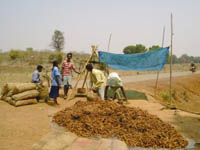
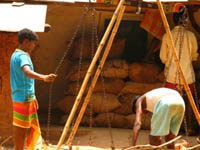
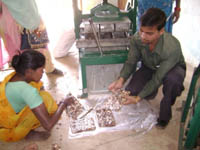
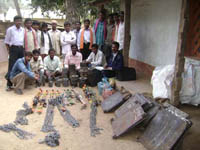
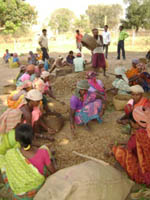
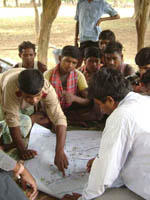
Training and marketing support for this activity was provided by consortia partner Sanjivani. Direct marketing was also done by the groups. The processed material was stored in cold storage and marketed when the price was higher. This added further value of Rs 2.0/ kg of processed tamarind.
On an average each family of collection group obtained Rs 8200. The procurement group earned profit of Rs 48000 per group by sale to processing group. The two processing groups processed 1700q of tamarind and earned a profit of Rs 27000 per group. Rs 3.4 lac is distributed to 92 families involved in processing and 4350 man days of employment is generated. Procurement and processing starts from February and lasts up to mid June.
The profit sharing mechanism and management of seed money fund was decided by group.
With the help of project support the groups could procure only 30% of the available tamarind in project villages. This indicated that there is still more possibility of generating income and employment by this activity. It is proposed to replicate this model in Tahakapal, Turangur and Turenar clusters where groups are formed.
In order to further add the value in form of paste, sauce, and candy a support of Rs 14.5 lac is provided by Jila Panchayat for formation of 10 groups. This will help in further increase in profitability in this trade.
(Source: NAIP, ICAR, New Delhi)








Like on Facebook
Subscribe on Youtube
Follow on X X
Like on instagram